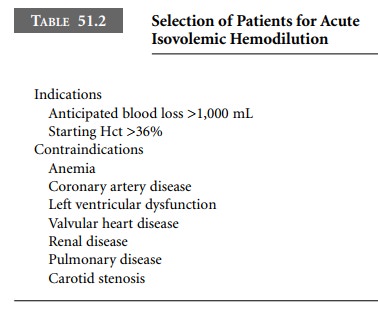Chapter: Clinical Cases in Anesthesia : Blood Replacement
Which patients are suitable candidates for AIHD?
Which patients are suitable candidates for AIHD?
The indications and contraindications for AIHD
are listed in Table 51.2.
The essential criteria are an anticipated blood
loss greater than 1,000 mL and a starting Hct of 36% or greater. Routine use of
AIHD has been described for a wide variety of cases, including major urologic
surgery, orthopedics, gynecologic surgery, plastic and reconstructive surgery,
neurosurgery (brain and tumor resection), and cardiotho-racic surgery.
Reduction in homologous blood usage has been reported to vary from 18% to 90%.
Age per se is not a contraindication to hemodilution, and its use has been
described in both the elderly and pediatric populations.

Because the major compensatory mechanism for
hemodilution is an ability to increase blood flow, iso-volemic hemodilution is
contraindicated in those whose ability to increase either systemic or coronary
blood flow might be compromised. Thus, AIHD is contraindicated in patients with
anemia, carotid artery stenosis, coronary artery disease, left ventricular
dysfunction, and aortic or mitral valve stenosis. Because of the fluid shifts
involved, AIHD is contraindicated in patients with renal or pulmonary disease.
Significant pre-existing myocardial or brain
disease represents a contraindication to isovolemic hemodilution because myocardial
ischemia and cerebral hypoxia are its major associated complications.
Coagulopathies emanating from reduced factor levels may be exacerbated by
dilutional effects.
Related Topics